Press Gazette had just launched its Save Our Sources campaign after the disclosure that police had looked at Tom Newton Dunn's phone records to trace the source of the Plebgate story. The Operation Elveden trials were under way with more than 20 tabloid journalists preparing to face court for paying contacts for stories. There was disquiet about the long periods people were spending on police bail before learning whether they were to be prosecuted.
By the time the book was published on Monday, the landscape had changed. Press Gazette's campaign had succeeded in securing a statutory instrument that meant a judge must sign off on police applications to view journalists' communications records if the objective was to uncover sources.
Several journalists charged over payments to sources had been cleared by juries and the only two convictions were overturned. A wholesale review of Elveden cases led to most prosecutions being abandoned - although the contacts betrayed by News International's Managements and Standards Committee still face trial.
Theresa May had said that she wanted to reduce to 28 days the maximum time anyone had to spend on police bail.
In spite of promises after the Mid Staffs scandal, whistle-blowers are still hunted down. Indeed, the first response of any organisation found wanting is often to set up an investigation to find out who leaked the story rather than to put its house in order.
Press Gazette has reported on armies of PR staff employed across government and by the police, at great expense to the public purse, with the apparent objective of keeping reporters away from ministers, councillors, policemen, doctors, soldiers - anyone with first-hand knowledge of any situation. Every piece of information has to be filtered through "official channels".
When Tony Blair came to power, Peter Mandelson and Alastair Campbell set out to control the news agenda. They established a rebuttal unit and would be on the phone to protest the moment the first editions were up if a newspaper's report was not to their liking.
That infant control freak has grown into a monster, so that we have a general election campaign where Labour bars Tory newspapers from its events, where the Guardian is denied access to a school where Cameron is campaigning, where local journalists who are best placed to know about the issues in their constituencies are refused permission to ask questions when the election charabanc rolls into their towns.
And, of course, the rise of social media since the last election means that politicians are bypassing any journalistic scrutiny by tweeting and emailing and Facebooking their campaign messages.
This situation is a real threat to the freedom of information and democracy. We cannot live in a society where only approved people may speak to reporters, where only the authorised message is allowed to get through.
Not a bit of it.
Our whole industry was tainted by the phone-hacking scandal - and that includes the Mail and Express groups that have insisted they had no part in such activities and which have largely escaped the attention of the Met.
But there has been no sense of contrition or of reform.
Paul Dacre, who presides over the most complained against and censured news organisation in the country, also presides over the industry's code of ethics. You might think that when the Press Complaints Commission was disbanded - or, as Hacked Off would say, rebranded - and replaced by Ipso, he might have felt it politic to step aside. But, no. There he is like some journalistic Sepp Blatter unable or unwilling to see that his organisation's credibility might improve if someone else were in his chair.
What message does that send?
As successive Elveden cases have collapsed, we have heard tales of woe from journalists whose lives and whose families' lives had been disrupted for years on end. We have heard about dawn raids, terrified children, lost birthdays - as though this had never happened to anyone else subsequently cleared by a court of law. These men and women have legitimate grievances. They should not have been put through all that just for doing their jobs.
There are legitimate questions to be asked about the cost of Leveson, the police investigations and the subsequent trials, about the use of resources.
But where those journalists' experiences could have been used to campaign for improvements in the system to the benefit of thousands of innocent people, they were instead put forward as evidence of an Establishment witch-hunt, making the Press again seem self-absorbed and self-serving
And lost in all this were the sources who went to jail or are still facing trial because of that Management and Standards Committee.
How can we stand up and argue about our role in calling those in authority to account when reporting is so skewed?
The Labour manifesto includes a promise to implement the "full Leveson" and the Tory Press is running scared.
Rupert Murdoch is reported to have complained that the Sun was not doing enough to prevent a Labour victory. Well, it's doing its damndest now - including Scottish and English front pages urging voters to back different parties. The official line is that the two papers have different editors, different audiences. Few believe, however, that the objective is anything other than to keep Ed Miliband out of Downing Street.
The Mail, in common with the Sun, has attacked "Red Ed" at every opportunity and perpetuated the myth that he "stabbed his brother in the back" by running for the Labour leadership "against their mother's wishes". The venality has been breathtaking. Many people might believe that David Miliband would have been a better choice - but he had no divine right to succeed Gordon Brown. And remember, Ralph Miliband, "the man who hated Britain" was his father too. There is every chance that that hatchet job would still have found its way into print had the elder Miliband become Labour leader.
The Telegraph has meanwhile given up any pretence of balanced reporting, surrendering its front page to Tory propaganda "Miliband's bad for business" letters twice last month.
Of last night's Question Time leaders' debate, it complained that Conservative supporters were outnumbered two-to-one among the audience, yet again proving the BBC's "leftwing bias".
The configuration was 25% Labour, Liberal and Conservative supporters, 25% others. Since LibDems and Greens were more likely to be left-leaning, in the view of chief political correspondent Christopher Hope, that meant two-thirds of the audience would be against the Tories. For heaven's sake.
Earlier in the week Miliband was mocked for agreeing to that encounter with Russell Brand - and the Tory papers had negative reviews on their websites within moments of the interview ending.
But who is to say he was wrong? A million people watched and they will have made up their own minds about it without any guidance from the Telegraph, Star, Mail or Sun.
The politicians have decided that they need us any more. They are connecting directly with the voters.
And if the papers can't do better than clumsy photoshopping, character assassinations and propaganda, readers will soon decide that they don't need us either.
SubScribe: Attacks on the Press

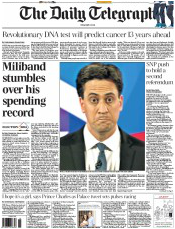

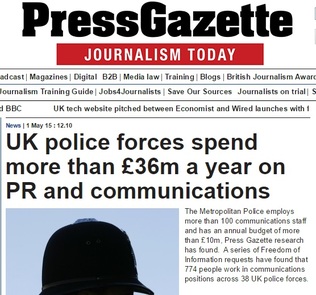
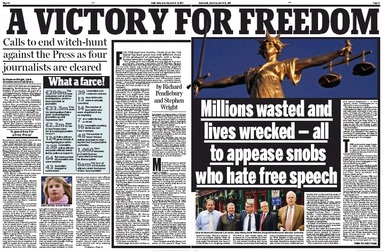
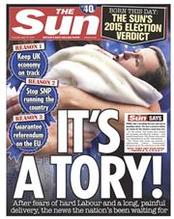
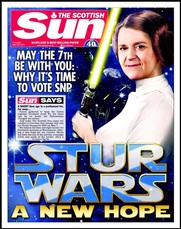
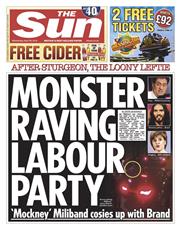
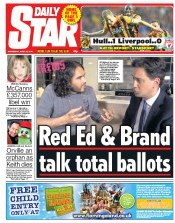
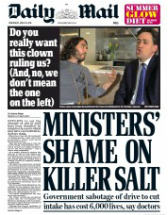

 RSS Feed
RSS Feed


